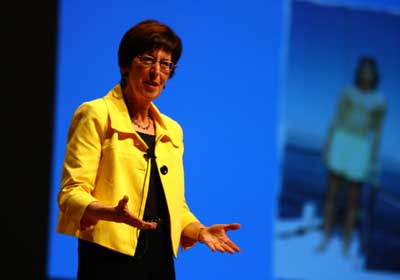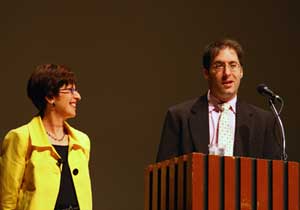 |
| Laine Cohen speaks to students in the Faculty of Health Professions about her family's encounters with health care professionals through the recovery of her son Daniel. (Bruce Bottomley Photo) |
‚ÄúMake us part of the team.‚ÄĚ With those words, Lainie Cohen issued a plea, an indictment and a call to community to more than 900 student Health Professionals Tuesday night at the Rebecca Cohn Auditorium.
Ms. Cohen was in Halifax to talk about family-centred health care. Her audience: a packed house of first-year students from more than 20 health care programs, brought together to hear her family’s experiences with health care professionals in the aftermath of her son Daniel’s brain injury.
Daniel‚Äôs presence was invoked from the outset of her talk. His image‚ÄĒthat of a young, handsome man, tanned and smiling‚ÄĒwas projected for a long time behind her as she talked about her son before his injury. Affectionately known as a ‚Äújock‚ÄĚ and a ‚Äúhunk,‚ÄĚ Daniel broke records in water skiing, loved to play hockey and basketball, was a camp counsellor, enjoyed his friends and family before a car accident at the age of 17 changed the course of his life and the life of his family and friends. Lainie Cohen wanted her audience to know her son in even this small way. ‚ÄúNo two brain injuries are the same,‚ÄĚ she said. ‚ÄúAnd no two families are the same either.‚ÄĚ
Knowing the patient, the patient‚Äôs family and community, was an important theme for Ms. Cohen during her moving, illuminating and sometimes painful discussion of her family‚Äôs experiences. She argued that families must be involved as partners in patient care, and be allowed to have input on choices and decisions around treatment. ‚ÄúFamilies often feel disenfranchised,‚ÄĚ she says, noting that a family‚Äôs wish to become participants in the treatment process can be viewed as a threat by some health care providers who may see family advocacy as too demanding or aggressive. But Ms. Cohen says, ‚ÄúIf you‚Äôre not doing what needs to be done for my child, I‚Äôm going to be in your face.‚ÄĚ
 |
| Lainie Cohen and her son Daniel. (Bruce Bottomley Photo) |
She cites an encounter with a young resident as ‚Äúone of the worst experiences‚ÄĚ with a health care professional during Daniel‚Äôs long recovery process.¬† The resident stepped in after a neurosurgeon failed to show up for a family meeting almost two hours after a scheduled appointment.¬† She proceeded to describe a consultation in which the resident delivered a text book analysis of Daniel‚Äôs hopes for the future with all the warmth and sensitivity of an auto mechanic talking about overhauling an engine.
How information is conveyed to patients and families is ‚Äúcritical,‚ÄĚ says Ms. Cohen. ‚ÄúPut yourself in the position of a family member.‚ÄĚ She further advised students to ‚Äúcontrol‚ÄĚ their choice of language and the amount of information given, cautioning that ‚Äúreadiness to absorb information varies‚ÄĚ among patients and families. Other recommendations for future health care professionals included listening to patients and families, explaining what is happening in language that recognizes their often fragile state, and broadening the idea of family to include friends and other supports who can play an active role in a patient‚Äôs recovery. And she asks that health care providers not always go by the book. ‚ÄúTry some dignified risk taking. Sometimes the best answer is ‚ÄėI don‚Äôt know.‚Äô‚ÄĚ
And finally, Lainie Cohen asked that health care providers learn to ‚Äúfacilitate hope.‚ÄĚ She acknowledges that this is a controversial request of health professionals wary of misleading their patients. But she says, for example, test scores used to predict functional outcomes for brain injured patients only tell part of the story. ‚ÄúThere is no measure for motivation, determination and tremendous friends,‚ÄĚ she says.
Daniel Cohen has the last word on hope. Now employed and living independently, he reflects on his ongoing recovery: ‚ÄúIt‚Äôs not how good you are. It‚Äôs how bad you want it.‚ÄĚ
